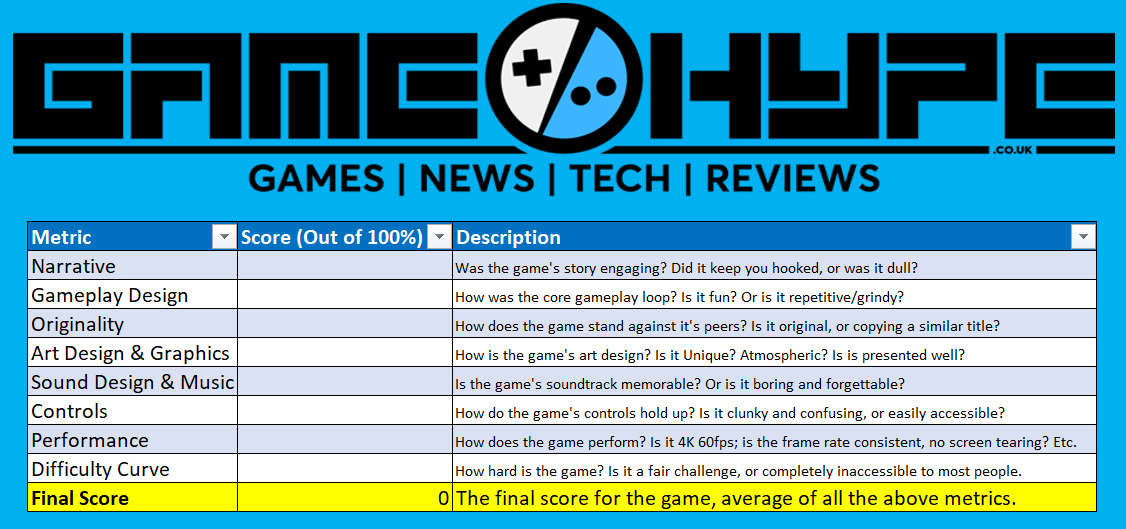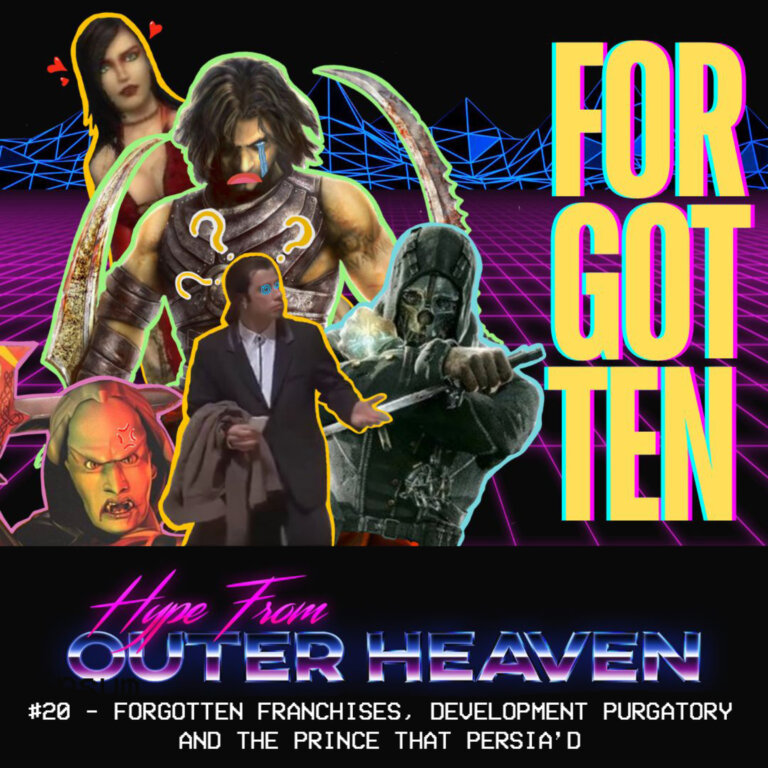Here at Game Hype, all of us are first and foremost gamers before anything else. From our inception in 2016, we set out on a mission of culturing an un-biased UK based gaming outlet which covers news and reviews for both software and hardware, giving our writers their own individual voices in the process. We take reviewing very seriously, for both our readers and for the PR Companies and Developers that choose to work with us; we like to ensure that they’re both confident that any coverage that we provide is clear and transparent whilst being fair to the title that is under review. There have been examples of both good and bad games over the years, some being industry-changing, whilst others going down in history as some of the worst titles ever conceived. The written and spoken word is important, especially when it comes from an un-biased source; too often within the industry do you hear of publications giving favourable reviews in exchange for pre-release perks, early access to certain games or rumours of being outright paid in some cases; which is something that Game Hype prides itself on for being a 100% un-biased gaming news source.
Opinions are like arseholes; everybody has one and everyone is entitled to deposit their opinion on a subject/title/product, that’s how this all works. Being a site comprised of primarily written reviews, we are aware that the industry changes at every given second, especially when it comes to aggregate scoring for gaming publications across the board. Many publications use what has been dubbed by some online as the ‘Modern Review Scale’ defaulting reviews to scale based on 7-10, irrespective of the quality of the title in question. Whilst the issue is somewhat endemic in the industry as a whole, here at Game Hype we pride ourselves on having a unique system of scoring that allows us to be as transparent as we possibly can when it comes to scoring a video game. Here at Game Hype, any review that we do is graded against 8 individual metrics which (as of 2024) will be clear to see on all our reviews on our publication. Firstly, is Narrative; a game’s story is important, it needs to hook the player and keep you engaged throughout its runtime, stories that fall flat don’t keep players immersed for very long. Next is Gameplay Design, the way the game plays is key here, the core gameplay itself (or loop if it’s an online title) needs to be fun and engaging otherwise it can be one of the quickest killers of a title. Originality is also important, if a game does something new which changes the industry, rather than just copying what’s popular at the current moment, then that deserves praise; equally, improving something that currently exists also comes with it’s own merit.

Following Originality, Art Design & Graphics as well as Sound Design & Music are arguably where a game goes beyond being memorable and enters the realm of being considered a piece of art in its own right; conversely a game which might be ‘deemed’ to have terrible graphics might have excellent gameplay, and hold down a particular art style, so it’s important to remember that these metrics are largely opinion based and reflect those of the writer at the time of the review. Following that is Controls, which arguably determine how accessible a game is to the player. Some games with subjectively terrible controls may fall into the realm of survival horror (think tank controls from early Resident Evil games) but are there to add to the game rather than subtract from it; whilst others are just overly clunky controls that make the game a chore to play. Nothing is arguably more important to gamers in this day than Performance, with most favouring a buttery-smooth 60fps experience at 4K resolution over a muddy 1080p with an inconsistent 30fps that jumps all over the place. Finally we have Difficulty Curve; some games are objectively hard with good reason (think Dark Souls) as the steep challenge and skill curve is what the series are known for; some games however are known for having a skill curve which is the equivalent of running head first into a brick wall, which isn’t fun for anyone involved. Ultimately the scores we provide for games are based on average these 8 metrics, which represents all of the core components of subjectively sitting down and giving a rating to a game. There may possibly be a window of favouritism when it comes to titles, but this should in no way reflect more than 10% of the score given in most circumstances; some games have issues, but there is the odd occasion where the game’s other qualities are so great that it overshadows the issues in question, which is 100% subjective to the writer at the time of writing the review. Once a score is given, there will a summary given by the writer of the review itself, detailing the major points made throughout the 1500-2500 written piece. Alongside that, as a general metric we consider the scores to fall into the following categories upon completion:
The Game Hype Scoring Scale
- 0 to 20% Terrible, no redeeming qualities; reserved for the worst games ever made.
- 20 to 30% Bad, with some minor redeeming qualities; very niche circles may enjoy but for most people its generally a bad game.
- 30 to 40% Uninspired, boring, hard to recommend; not the worst game ever made, but not far off.
- 40 to 60% Competent, run of the mill, average; a lot of games fall into this category, whether one enjoys or not depends on personal taste.
- 60 to 70% Good game, not the best, but certainly an enjoyable experience with many redeeming qualities.
- 70 to 80% Really good, bordering on amazing; most games in this category are loved by most people, few minor issues, but nothing that ruins the experience.
- 80 to 99% Stellar experience; bordering on perfect. What games should aspire to be, strong example of the best the industry has to offer.
- 100% Potential GOTY contender; very few games make it here, reserved for the 1% that truly stand as genre-defining.
If by chance you’ve made it this far, we hope the above makes our review structure that much clearer. If you’re a reader and have been with us for many years, then thank you. Your continued support is what has allowed Game Hype to thrive into the community that it is. For any future public relations/developers/publishers that decide to work with us; we’ve had massive success since our inception in 2016 and have strong working relationships with some of the industry’s biggest hitters, but we’re always on the lookout for new opportunities. Whether it be press releases regarding upcoming releases, gaming news, review opportunities for software or hardware, please don’t hesitate to reach out to our Senior Features Editor: Kyle Doherty (kyle.doherty@gamehype.co.uk) or our very own Editor-In-Chief & Codemaster: Adam Neaves (adam.neaves@gamehype.co.uk); alternatively, please use the contact form below and we’ll get back to you ASAP.
We hope to see you out there! Stay Frosty!


